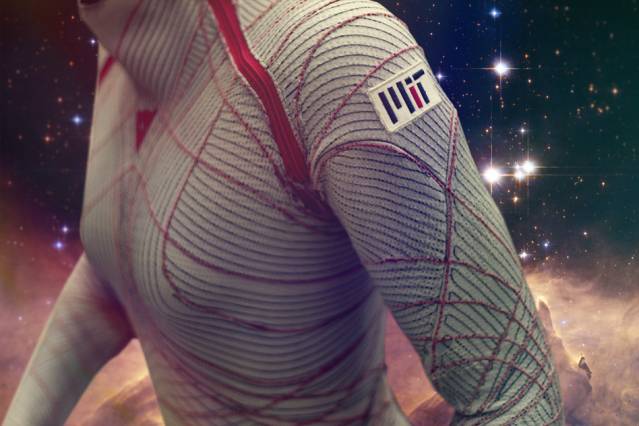 The MIT BioSuit, a skin-tight spacesuit that offers improved mobility and reduced mass compared to modern gas-pressurized spacesuits. Photo-illustration: Jose-Luis Olivares/MIT
The MIT BioSuit, a skin-tight spacesuit that offers improved mobility and reduced mass compared to modern gas-pressurized spacesuits. Photo-illustration: Jose-Luis Olivares/MIT
Researchers from MIT have succeeded in designing a skin-tight, pressurized spacesuit integrated with tiny, spring-like coils, which contract when heated. Shape-memory alloys (SMA) were used to create the coil.
SMAs are materials that can return to their original shape when bent or deformed. They have a very special ability to “remember” their original shape.
The astronauts would wear this stretchy, lightweight spacesuit, connected to the power supply of the spacecraft resulting in contraction of the coils and shrink-wrapping of the suit around his/her body. The astronaut must then simply apply a moderate force to bring the suit back to its previous form.
The coils were integrated in a tourniquet-shaped cuff and a current applied for heat generation. At a specific trigger temperature, contraction of the coils took place to their “remembered” shape, causing the cuff to tighten.
Further tests proved that the pressure that the coils generated was equal to that needed to completely support a space astronaut.
Professor of Astronautics, Aeronautics and Engineering Systems at MIT, Dava Newman led the research and the design of the coil was devised by a postdoc in Newman’s lab, Holschuh. The research is published in the journal IEEE/ASME: Transactions on Mechatronics.
Skin-tight spacesuits have been suggested previously but there has always been the question of "how does one fit in and out of an extremely tight suit?". Holschuh studied 14 kinds of shape-changing materials and finally selected nickel-titanium SMAs.
For “training” the material, Holschuh wound raw SMA fiber to very tight, millimetre-diameter coils and they were then heated to 450°C to bring them to a "trained" or original shape. At specific temperatures, as low as 60°C in this case, the fiber comes back to its tightly coiled trained state.
The researchers are working on a mechanism to clip or lock the coils in place so that the suit remains tight.
The MIT Portugal Program and NASA funded the research.